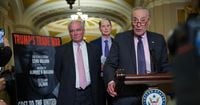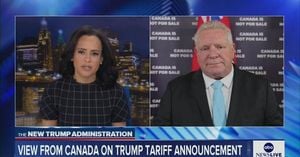On April 2, 2025, the Senate delivered a significant blow to President Donald Trump by passing a resolution aimed at blocking his controversial tariffs on Canada. The resolution, which passed by a narrow 51-48 vote, saw four Republican senators break ranks with their party to join all Democratic senators in opposing the tariffs. This vote marks a pivotal moment in the ongoing trade war initiated by Trump, who had recently announced sweeping tariffs on multiple countries, dubbing the day "Liberation Day."
The resolution specifically seeks to terminate the national emergency declared by Trump, which he cited as a justification for imposing a 25 percent tariff on Canadian imports. The President's rationale for these tariffs centered on combating the flow of fentanyl across the U.S.-Canada border. However, critics, including the senators who voted for the resolution, argue that the tariffs could harm the U.S. economy and disproportionately affect American consumers.
Among the Republican senators who sided with Democrats were Mitch McConnell of Kentucky, Lisa Murkowski of Alaska, Susan Collins of Maine, and Rand Paul of Kentucky. McConnell, a prominent figure in the GOP, has publicly expressed his disapproval of tariffs, stating, "I’m not a fan of tariffs," and warned that they would lead to increased prices for consumers and hurt industries reliant on trade.
Collins, who faces re-election, highlighted the negative impact the tariffs would have on Maine's economy, particularly for industries such as agriculture and tourism that depend on cross-border trade with Canada. "Tariffs on imports like fertilizer will only hurt Maine potato growers," she said during her speech on the Senate floor. Meanwhile, Paul, a co-sponsor of the resolution, criticized the President's unilateral approach to imposing tariffs, arguing that such decisions should involve congressional approval.
Trump's response to the Senate's action was swift and scathing. In a post on Truth Social, he accused the four Republican senators of being "unbelievably disloyal" and suffering from what he termed "Trump Derangement Syndrome." He urged constituents to contact their senators and express their opposition to the resolution, framing it as a Democratic ploy to undermine his authority.
Despite the Senate's passage of the resolution, its ultimate fate remains uncertain. The Republican-controlled House is unlikely to take up the measure, and Speaker Mike Johnson has already indicated that he will not bring it to the floor for a vote. This dynamic underscores the ongoing tension within the Republican Party, as members grapple with their support for Trump amidst growing concerns over the economic implications of his trade policies.
Senate Democratic leaders, including Tim Kaine of Virginia, who spearheaded the resolution, view the vote as a significant victory. Kaine emphasized that the tariffs are not only a threat to the economy but also a misguided response to a complex issue like fentanyl trafficking. He noted that the majority of fentanyl entering the U.S. does not come from Canada, challenging the justification for the tariffs.
Furthermore, economic analysts have raised alarms about the potential repercussions of Trump's tariffs, warning that they could lead to price increases on everyday goods and even trigger a recession. Following Trump's announcement of the tariffs, stock futures dropped sharply, reflecting investor concerns about the economic fallout.
Senate Minority Leader Chuck Schumer remarked on the importance of the bipartisan support for the resolution, asserting that it demonstrates a recognition among Republicans of the unpopularity of Trump's tariff policies. "Every single Senate Republican should support Tim's resolution, and support American families," he stated.
On the other hand, Republican leaders have attempted to rally their members around Trump's agenda, arguing that the tariffs are necessary for addressing the fentanyl crisis and securing the border. Majority Whip John Barrasso contended that ending the emergency declaration would embolden drug cartels to increase their operations at the northern border.
As the Senate prepares to move forward, the divide within the Republican Party is becoming increasingly evident. While some members align themselves with Trump’s protectionist policies, others express a desire to return to a more traditional pro-trade stance. This internal conflict could have lasting implications for the party as it approaches future elections.
In summary, the Senate's recent vote against Trump's tariffs on Canada illustrates a growing rift within the Republican Party and highlights the complex dynamics of U.S. trade policy. As the debate continues, both sides will be watching closely to see how this issue unfolds in the coming weeks and months.








